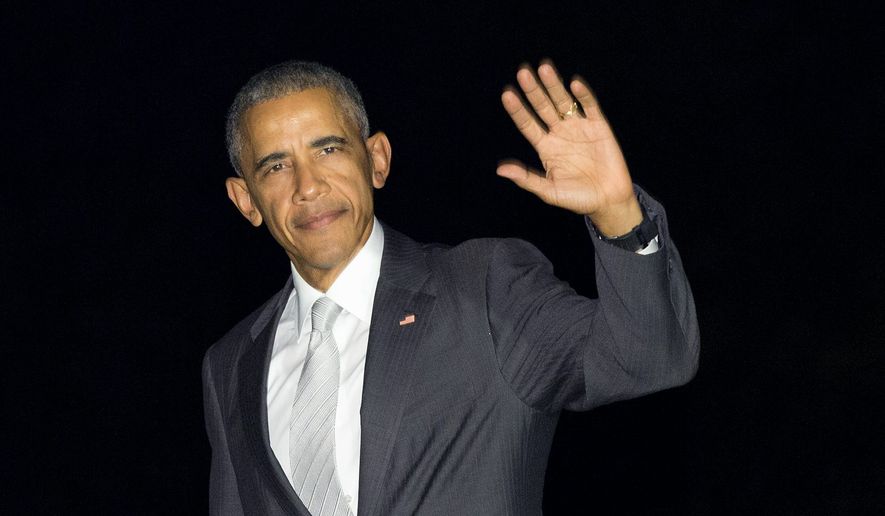Republicans are weaponizing Obamacare’s latest struggles in the final days of the 2016 campaign, hoping outsize rate hikes and dwindling choices will tilt the balance in key states even if only a small percentage of voters actually use the program.
GOP presidential nominee Donald Trump argues battleground states will be hit particularly hard — if not now, then certainly later — by the law’s wobbly economics.
It’s become a key part of his stump speech, even if recent polling suggests voters are picking Mr. Trump or Democratic rival Hillary Clinton based on issues like the economy, foreign policy and the candidates themselves, as questions about Mr. Trump’s temperament and Mrs. Clinton’s emails continue to dog the campaigns.
“I’m not sure how many voters will be persuaded to switch from Clinton to Trump because of the news, but if it energizes Republicans and helps Trump unify the GOP, that will help him pull closer. And a more narrow loss will help Republican candidates in Senate and House races,” said Nathan Gonzales, editor of the Rothenberg & Gonzales Political Report.
President Obama argues consumers will be “pleasantly surprised” by their options if they actually log onto the federal HealthCare.gov website or state-run insurance exchanges. Customers can window-shop now ahead of the open enrollment, which begins Tuesday and ends Jan. 31.
Yet the immediate Obamacare outlook is bleak in Arizona, where Sen. John McCain is using the program’s troubles to pad his lead over Rep. Ann Kirkpatrick — one of the few Democrats in key Senate races who cast a vote for the Affordable Care Act in 2010.
The Republican senator put his foot on the gas this week, saying Ms. Kirkpatrick refuses to “take responsibility” after the administration said 27-year-olds choosing popular “benchmark” plans in the state would see their monthly premium bill jump by an average of 116 percent, before taxpayer-funded subsidies that tamp down costs for qualified customers.
“While attitudes about Obamacare are pretty baked into the cake, McCain has been using the issue effectively for weeks,” said Jennifer Duffy, an editor at The Cook Political Report. “I expect that it will be helpful to Republicans in states seeing the highest premium increases and fewer choices of plans. The issue is already or will soon be used in Indiana, Missouri, Wisconsin and North Carolina.”
Indeed, residents in much of North Carolina can only choose from one insurer on the exchange set up by the Affordable Care Act.
The state is considered a must-win for Mr. Trump, and Republican Sen. Richard Burr is in the fight of his life against Democratic challenger Deborah Ross, who acknowledged from the debate stage this month that she would have voted for Obamacare despite its troubles, saying it was better than the old system.
Republican Senate candidates in Indiana and Wisconsin are casting their Democratic opponents — former Sens. Evan Bayh and Russ Feingold — as the “deciding vote” for the health overhaul in 2010.
A group dedicated to supporting Democrats, the Senate Majority PAC, said Friday it is pouring money into Wisconsin, where Republican Sen. Ron Johnson is keeping the race close.
Republicans have used Obamacare’s rocky implementation as a political cudgel for years, but they ramped up their attacks last week after the Health and Human Services Department said 2017 premiums for popular plans on the exchanges would jump by an average of 25 percent on the federal HealthCare.gov portal serving 39 states, and by a 22 percent average nationwide.
Roughly one in five customers will have only a single insurer to choose from next year after major players like UnitedHealth Group and Aetna withdrew from most states, and nearly all of Obamacare’s co-op plans failed.
The White House noted that a relatively small proportion of Americans are affected. Roughly 10 million people are in the exchanges, versus 154 million Americans who get health insurance from an employer, plus scores of millions on Medicare, Medicaid, the VA and other government programs. And of that 10 million who do enter the web-based marketplace, taxpayer-funded subsidies cushion the financial blow for more than 80 percent.
Yet Republicans said those subsidies are costly and that rising costs have confirmed their longstanding fears about the 2010 law.
“It’s been a rough week for Obamacare — but not nearly as rough as next year will be for everyone who’s forced to use it,” Speaker Paul D. Ryan, Wisconsin Republican, said in a statement last week. “This law is fundamentally flawed and hurting the people it was supposed to help the most.”
Mr. Trump likes to take it a step further, frequently citing the eye-popping 116 percent spike in Arizona even if he’s at rallies in Ohio or New England.
“Obamacare is a catastrophe beyond imagination,” he told New Hampshire voters on Friday, where benchmark rates are poised to rise only 2 percent.
Whether the news sways many voters at this point is hard to gauge, but it can’t hurt Mr. Trump’s efforts to consolidate the Republican base, said GOP strategist Ford O’Connell.
“Some Republicans might not like Trump,” he said, “but they all feel the same way about Obamacare.”
• Tom Howell Jr. can be reached at thowell@washingtontimes.com.




Please read our comment policy before commenting.